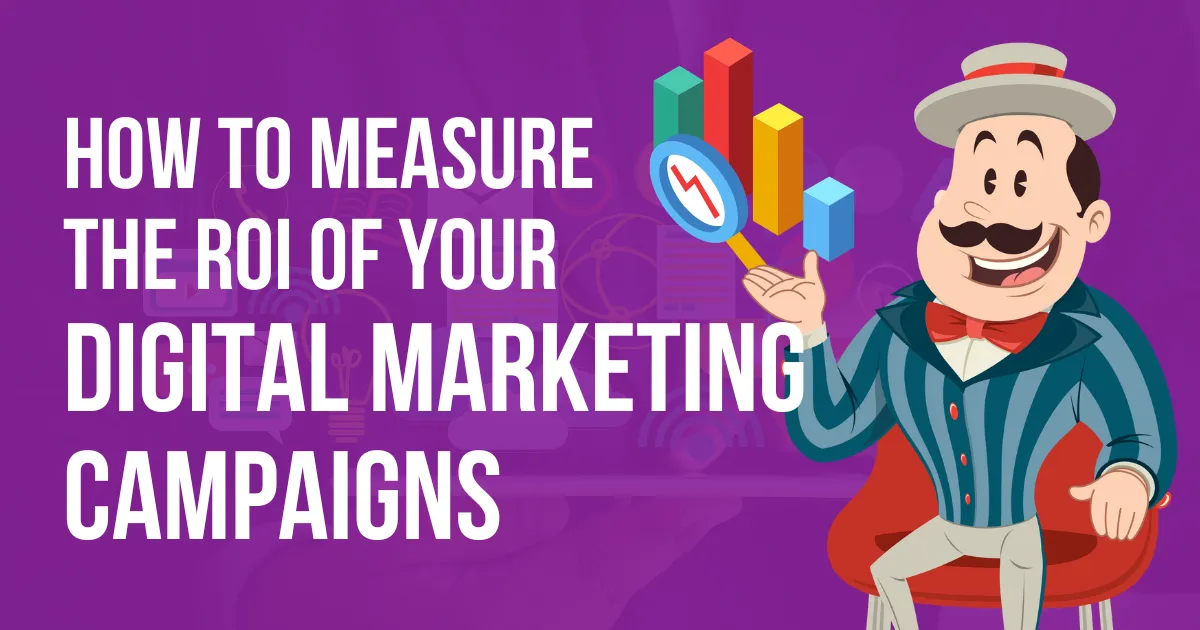
Measuring the return on investment (ROI) of your digital marketing efforts is crucial for understanding the effectiveness of your campaigns and making informed decisions for future strategies. This blog will provide clear, actionable steps to help you accurately measure the ROI of your digital marketing activities, with a focus on simple and practical approaches.
1. Define Clear Goals and Objectives
To measure ROI effectively, you need to have clear goals and objectives. Whether it’s increasing website traffic, generating leads, boosting sales, or enhancing brand awareness, defining what success looks like is the first step.
2. Track Key Performance Indicators (KPIs)
Identify the key performance indicators (KPIs) that align with your goals. Common KPIs for digital marketing include:
- Website Traffic
- Conversion Rate
- Cost Per Lead (CPL)
- Customer Acquisition Cost (CAC)
- Customer Lifetime Value (CLV)
- Return on Ad Spend (ROAS)
- Social Media Engagement
Each of these metrics provides insight into different aspects of your digital marketing performance.
3. Use Analytics Tools
Leverage analytics tools to track and analyze your KPIs. Google Analytics is a popular choice for tracking website performance, while social media platforms offer their own analytics tools. Other tools like HubSpot, SEMrush, and Ahrefs can provide comprehensive data on various digital marketing channels.
4. Calculate Cost and Revenue
To measure ROI, you need to understand both the cost of your digital marketing efforts and the revenue generated. Include all expenses such as ad spend, software subscriptions, salaries, and any other related costs.
The basic formula for ROI is:
ROI=Net ProfitTotal Investment×100\text{ROI} = \frac{\text{Net Profit}}{\text{Total Investment}} \times 100ROI=Total InvestmentNet Profit×100
Net profit is calculated by subtracting the total investment from the revenue generated by your digital marketing efforts.
5. Attribution Models
Attribution models help you understand which channels and touchpoints contribute to conversions. Common models include:
- Last Click Attribution: Credits the last touchpoint before conversion.
- First Click Attribution: Credits the first touchpoint that led to conversion.
- Linear Attribution: Distributes credit equally across all touchpoints.
- Time Decay Attribution: Gives more credit to touchpoints closer to the conversion time.
Choosing the right attribution model helps you accurately measure the impact of each channel on your overall ROI.
6. Track Conversions and Leads
Use tracking codes and conversion pixels to monitor actions taken by users on your website. This includes form submissions, purchases, downloads, and other key actions. Google Tag Manager can simplify the process of managing tracking codes on your website.
7. Segment Your Audience
Segment your audience based on demographics, behavior, and interests to understand which segments are driving the most value. This helps you tailor your marketing strategies to different groups and optimize your ROI.
8. Monitor Customer Journey
Analyze the customer journey to identify which stages are most effective and where improvements are needed. Understanding the path users take from awareness to conversion helps you optimize each touchpoint.
9. Use A/B Testing
A/B testing allows you to compare different versions of your marketing campaigns to see which performs better. Test various elements such as headlines, images, CTAs, and landing pages to optimize your campaigns for higher ROI.
10. Regular Reporting and Analysis
Regularly review and analyze your data to identify trends, strengths, and areas for improvement. Create reports that summarize your findings and use these insights to make data-driven decisions.
11. Work with Experts
Partnering with a professional digital marketing agency, like a Mayfair SEO company, can provide you with expert insights and advanced tools to measure and optimize your ROI. These agencies have the expertise to implement effective strategies and track performance accurately.
12. Optimize Your Marketing Funnel
Evaluate and optimize each stage of your marketing funnel. From attracting potential customers at the top of the funnel to converting leads at the bottom, ensure each step is efficient and contributes to your overall goals.
13. Evaluate Content Performance
Assess the performance of your content by tracking metrics such as engagement, shares, and conversion rates. High-quality content that resonates with your audience can significantly boost your ROI.
14. Social Media Metrics
Social media is a critical component of digital marketing. Track metrics like follower growth, engagement rates, and click-through rates to understand the effectiveness of your social media efforts.
15. Email Marketing Metrics
For email marketing campaigns, monitor open rates, click-through rates, and conversion rates. Email marketing can be a powerful tool for nurturing leads and driving conversions.
16. PPC and Paid Advertising Metrics
For pay-per-click (PPC) and other paid advertising campaigns, track metrics such as cost per click (CPC), click-through rate (CTR), and conversion rate. Tools like Google Ads provide detailed insights into the performance of your paid campaigns.
17. SEO Metrics
SEO is a long-term investment that can yield significant ROI. Track metrics like organic traffic, keyword rankings, and backlink profile. Working with an SEO company, such as an SEO agency in Derby or a Westminster SEO company, can help you optimize your SEO efforts and measure their impact on your ROI.
18. Customer Feedback and Surveys
Collect customer feedback and conduct surveys to gain qualitative insights into your marketing efforts. Understanding customer satisfaction and preferences can help you tailor your strategies for better results.
19. Competitor Analysis
Analyze your competitors’ digital marketing strategies to identify opportunities and areas for improvement. Understanding what works for others in your industry can inform your own efforts and enhance your ROI.
20. Continuous Improvement
Digital marketing is dynamic, and continuous improvement is essential. Regularly update your strategies based on performance data, industry trends, and technological advancements.
Conclusion
By following these steps, you can effectively measure the ROI of your digital marketing efforts, make data-driven decisions, and continuously optimize your strategies for better performance. Partnering with a reputable Digital marketing agency in the UK can provide you with the expertise and tools needed to maximize your digital marketing ROI.